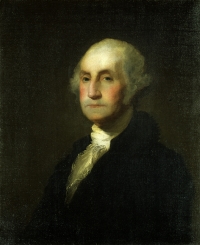
On August 5, 1789, the Senate rejected for the first time a presidential nominee. At the urging of Georgia senator James Gunn, the Senate failed to confirm Benjamin Fishbourn, President George Washington’s nominee to serve as federal naval officer for the Port of Savannah. The Senate’s rejection of Fishbourn has been regarded as the first assertion of “senatorial courtesy,” the practice whereby senators defer to the wishes of a colleague who objects to an individual nominated to serve in his or her state. Senatorial courtesy also has been interpreted to mean that a president should consult with senators of his or her party when nominating individuals to serve in positions in their home states. Such a practice was not envisioned by the framers. In fact, in The Federalist, No. 66, Alexander Hamilton wrote: “There will, of course, be no exertion of choice [in executive appointments] on the part of Senators. They can only ratify or reject the choice of the President.”1
Like other office seekers, Fishbourn had written to Washington in hopes of securing a federal appointment in the new government. Fishbourn had served in the Georgia legislature and had been appointed earlier that year as state naval officer of Savannah by the state’s governor. He hoped to fill the same role for the federal government. Washington had informed Fishbourn that he would assume the presidency “free from engagements of every kind and nature whatsoever,” and would make appointments only with “justice” and “the public good” in mind. Fishbourn benefitted, however, from the support of General Anthony Wayne, under whom he had served as aide-de-camp during the Revolutionary War. Wayne had a close bond with Washington and had recommended Fishbourn for a position in the government. As a result, Fishbourn’s name was added to President Washington’s long list of nominees to serve as customs collectors, naval officers, and land surveyors throughout the country that was presented to the Senate on August 3, 1789. The Senate confirmed most of the nominees on the list the next day. Two other nominees from Georgia were confirmed on August 5, but the Senate, at the urging of Senator Gunn, rejected Fishbourn.2
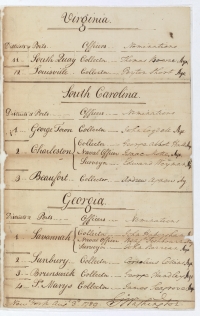
Why did Senator Gunn object to Fishbourn? The drama surrounding the nomination can be traced back to a duel challenge and personal rivalries. Affairs of honor, in which men in the public eye were willing to exchange gunfire and risk death in defense of their reputations, were an important element of politics in the early American republic. In 1785 James Gunn, while serving as an army captain, feuded with Major General Nathanael Greene over a rather arcane military policy. At some point during the Revolutionary War, James Gunn’s horse was killed in battle. He was able to select a government-procured horse to use during the remainder of the war, as was custom. The problem arose when Gunn traded the horse, which was considered to be quite valuable, for two other horses and an enslaved individual. General Greene objected to the transaction, not for the atrocity that an enslaved person was considered property equivalent to a horse, but because Gunn had dispensed with government property as if it was his personal property. Greene called for a military court of inquiry to investigate. The court ruled that Gunn was justified in trading the horse, but Greene was not satisfied. He ordered Gunn to return the horse and referred the matter to the Continental Congress. Congress adopted resolutions supporting Greene’s actions and ordered Gunn to replace the horse with “another equally good.”3
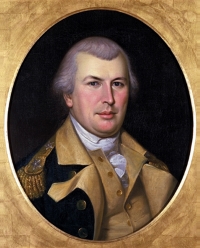
After the war, both Gunn and Greene settled in Georgia. Gunn, still smarting from what he saw as Greene’s attack on his character, challenged Greene to a duel. Greene refused the challenge, claiming that a commanding officer could not be accountable to a subordinate for his actions while in command. Gunn reportedly declared that “he would attack [Greene] wherever he met him” and began to carry pistols in the event of an encounter. The confrontation never occurred, and Greene received support from Washington himself, who assured him that his “honor and reputation will stand” for refusing to accept Gunn’s challenge.4
What does all of this have to do with Fishbourn and senatorial courtesy? Fishbourn had publicly sided with Greene during the dispute, and Gunn never forgot that. When asked by another senator to explain his reasons for objecting to Fishbourn, Gunn responded simply with “personal invective and abuse.” This was enough to sway other senators to vote down the nomination.5
Angry about the rejection of his nominee, Washington wrote in a message to the Senate, “Permit me to submit to your consideration whether on occasions where the propriety of Nominations appear questionable to you, it would not be expedient to communicate that circumstance to me, and thereby avail yourselves of the information which led me to make them, and which I would with pleasure lay before you.” Washington, according to one source, even went to the Chamber to ask the Senate’s reasons for the rejection, to which Gunn informed him that the Senate owed him no explanation.6
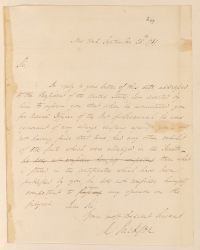
Fishbourn was stung by the rejection. His supporters attempted to undo the damage to his reputation. Anthony Wayne wrote to Washington to assure him that the “unmerited and wanton attack upon [Fishbourn's] Character by Mr. Gunn” was groundless and that he would never have recommended Fishbourn for the position if the charges were true. Wayne published a defense of Fishbourn signed by notable men from Savannah.7
A month later, Fishbourn sent a letter to Washington in hopes of repairing his reputation after such a public embarrassment. He asked the president to write him indicating that he held no prejudices against him based on “representations having been made against me in the Senate.” As he left Georgia and public life, he hoped “I may have it to say I have the sanction as well as the good wishes of his Excellency the President of the United States.” Fishbourn was probably disappointed to receive a reply only from an aide to Washington, stating “I am directed by him to inform you that when he nominated you for Naval Officer of the Port of Savannah he was ignorant of any charge existing against you—and, not having, since that time, had any other exibit (sic) of the facts which were alledged (sic) in the Senate . . . he does not consider himself competent to give any opinion on the subject.”8
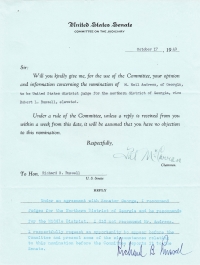
Senator James Gunn’s objection to Fishbourn for what he saw as an affront to his public honor—even if Fishbourn was but a minor player in the affair—established an enduring precedent in the Senate. Despite periodic efforts by presidents to push back on senators’ attempts to control executive appointments, the custom of senatorial courtesy became firmly established by the late 19th century. In 1906, two years prior to his run for president, William Howard Taft observed that presidents were “naturally quite dependent on . . . advice and recommendation” of senators, such that “the appointing power is in effect in their hands subject only to a veto by the President.” When considering a nomination in executive session—held behind closed doors until 1929—senators merely had to rise and announce that a nominee was “personally obnoxious” or “personally objectionable” to them, without any further explanation. They could depend on the deference of Senate colleagues in rejecting the nominee. The Senate Judiciary Committee formalized a version of senatorial courtesy through use of the “blue slip,” a blue sheet of paper on which a senator could register support for or opposition to a judicial nominee to serve in his or her state. In 1960 William Proxmire of Wisconsin called senatorial courtesy “the ultimate senatorial weapon,” a “nuclear warhead intercontinental ballistic missile of Senate nomination action.” While there have been changes to the rules and customs governing Senate advice and consent over the past half century—for example, senators no longer announce on the floor that a nominee is “personally obnoxious” to them—individual senators continue to exert a great deal of power over the nomination and confirmation process.9
Notes
1. Robert C. Byrd, The Senate, 1789-1989: Addresses on the History of the United States Senate, vol. 2, ed. Wendy Wolff, S. Doc. 100-20, 100th Cong., 1st sess. (Washington, DC: Government Printing Office, 1991), 31; Hamilton, The Federalist, No. 66, quoted in George H. Haynes, The Senate of the United States: Its History and Practice (Cambridge: Houghton Mifflin Co., 1938), 2:736.
2. Mitchel A. Sollenberger, “Georgia’s Influence on the U. S. Senate: A Reassessment of the Rejection of Benjamin Fishbourn and the Origin of Senatorial Courtesy,” Georgia Historical Quarterly 93, no. 2 (2009): 182–90; “From George Washington to Benjamin Fishbourn, 23 December 1788,” Founders Online, National Archives, accessed June 22, 2022, https://founders.archives.gov/documents/Washington/05-01-02-0148. [Original source: The Papers of George Washington, Presidential Series, vol. 1, 24 September 1788 – 31 March 1789, ed. Dorothy Twohig (Charlottesville: University Press of Virginia, 1987), 198–200.]; “To George Washington from Anthony Wayne, 10 May 1789,” Founders Online, National Archives, accessed June 22, 2022, https://founders.archives.gov/documents/Washington/05-02-02-0189. [Original source: The Papers of George Washington, Presidential Series, vol. 2, 1 April 1789 – 15 June 1789, ed. Dorothy Twohig (Charlottesville: University Press of Virginia, 1987), 261–64.]
3. Joanne B. Freeman, Affairs of Honor: National Politics in the Early Republic (New Haven: Yale University Press, 2002); George R. Lamplugh, “The Importance of Being Truculent: James Gunn, the Chatham Militia, and Georgia Politics, 1782–1789,” Georgia Historical Quarterly 80, no. 2 (Summer 1996): 228–29; Sollenberger, “Georgia’s Influence,” 185–87.
6. “From George Washington to Benjamin Fishbourn, 23 December 1788,” Founders Online, National Archives, accessed June 22, 2022, https://founders.archives.gov/documents/Washington/05-01-02-0148. [Original source: The Papers of George Washington, Presidential Series, vol. 1, 198–200.] Washington’s visit to the Senate was recounted years later by the son of Washington aide Tobias Lear. Notably, William Maclay was absent on that day, but he committed to his diary the comments of a fellow senator about Washington’s intemperate response to the rejection, though it is not clear if that occurred in person in the Senate chamber. Kenneth R. Bowling and Helen E. Veit, eds., Diary of William Maclay and Other Notes on Senate Debates, vol. 9 of Documentary History of the First Federal Congress of the United States of America, March 4, 1789–March 3, 1791, eds. Linda Grant De Pauw et al. (Baltimore: The Johns Hopkins University Press, 1986), 121.
7. “To George Washington from Anthony Wayne, 30 August 1789,” Founders Online, National Archives, accessed June 22, 2022, https://founders.archives.gov/documents/Washington/05-03-02-0330. [Original source: The Papers of George Washington, Presidential Series, vol. 3, 15 June 1789–5 September 1789, ed. Dorothy Twohig (Charlottesville: University Press of Virginia, 1989), 569–70.]
8. “To George Washington from Benjamin Fishbourn, 25 September 1789,” Founders Online, National Archives, accessed June 22, 2022, https://founders.archives.gov/documents/Washington/05-04-02-0054 [Original source: The Papers of George Washington, Presidential Series, vol. 4, 8 September 1789 – 15 January 1790, ed. Dorothy Twohig (Charlottesville: University Press of Virginia, 1993), 81–83; fn1.] This was quite a change in tone from December 1788, when Washington wrote in a letter to Fishbourn: “For you may rest assured, Sir, that, while I feel a sincere pleasure in hearing of the prosperity of my army acquaintances in general, the satisfaction is of a nature still more interesting, when the success has attended an officer with whose services I was more particularly acquainted.”; “From George Washington to Benjamin Fishbourn, 23 December 1788,” Founders Online, National Archives, accessed June 22, 2022, https://founders.archives.gov/documents/Washington/05-01-02-0148 [Original source: The Papers of George Washington, Presidential Series, vol. 1, 198–200.]
9. William Howard Taft, Four Aspects of Civic Duty (New York: Scribner’s Sons, 1906), 98–99, quoted in Haynes, Senate of the United States, 1:736; Congressional Record, 86th Cong., 2nd Sess., April 19, 1960, 8159; Michael J. Gerhardt, The Federal Appointments Process (Durham: Duke University Press, 2000), 143–53.